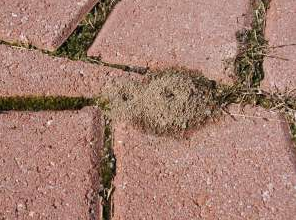A common problem that many people have are ants popping up in their pavers. While not as devastating as termites in your home it still is rather disconcerting and just how to get rid of them can be frustrating.

Pavers are becoming quite popular across the country and offer a distinct look and feel to any driveway, pool deck or sidewalk. In days of old entire city street systems were cobblestone which to the best of my knowledge was the original paver. Ants and other pests take advantage of all the minute nooks and seams and can set up entire colonies and pathways in the protective seclusion. What we may think of as solid and no trail could be possible they can simply navigate in the cracks or under the stones themselves easily going from point A to B.
The most frustrating and common complaint is ant mounds or dirt appearing in the middle of a beautiful deck or drive way. This happens more frequently in the pavers that are set in limestone or other such material and not so much to the ones laid on top of cement. At times it can get pretty bad as a colony grows or as new colonies also move in to take advantage of this pool side real estate.
5 rules of thumb
First; I would never recommend taking up any pavers to spray underneath. They are set so one grabs on to the other and you may not get the paver back in without some damage. Plus the evidence isn’t always right on top of where the heart of the nest is so you might end up pulling more than you bargained for.
Second; Although liquids may not be able to penetrate entirely you should still be able to get enough down to eradicate the nest. Before spraying first make sure what you’re using won’t stain. Find a hidden edge or corner and apply a small test spray. If it dries and leaves no stain you should be good. I would simply use my sprayer on a fine pin stream and soak all the cracks on and around the mound area. A 2 or 3 foot circumference around the mound should do.
Third; Set your sprayer on heavy fan or cone pattern and treat the outside edges and soil of the patio or walkway liberally. This barrier may not be the answer for this particular nest but will deter others who may move in this way. Granules around the soil perimeter is also helpful. In the case of a pool deck you should do in the deco drains with liquid as well as long as they don’t drain in to any storm water systems. Delta dust is an excellent alternative and the semi water proof dust will coat the entire drain quickly with just a few well placed puffs.
Forth; Talstar granules make for a perfect two fold solution. I’m told that every so often you are to place sand on your pavers and brush them in with a push broom. This is to replace missing sand and keep the pavers tight. Talstar is basically sand laced with the active ingredient bifenthrin. Water or moisture ‘activates’ the granule and the bifenthrin is released going down in to the crack giving you a nice barrier. I don’t think I’d use it on a pool deck per se because of wet bare feet coming in contact with it but it will work wonders on a drive or walk way.
Fifth; Any of these barriers will be short lived since they are exposed to the elements. During peak months of ant activity you should maintain the treatment around the perimeter of your pavers and deco drains of the pool at least once per month and only spraying the mounds when you see them. I would only use the Talstar with a push broom when it’s time for the rejuvenating of sand in the cracks. Also don’t use JUST the treated granule, that’s too much. Lightly sprinkle it in along with the recommended sand and follow your installers instructions.
The path an ant uses is paved with good intentions, all they want are the basic necessities of life and they mean you no harm. That sounds nice and maybe you could tolerate them in an old ratty shed but once you have pavers installed and get the bill, it’s time for the ants to hit the road.

Leave a Reply